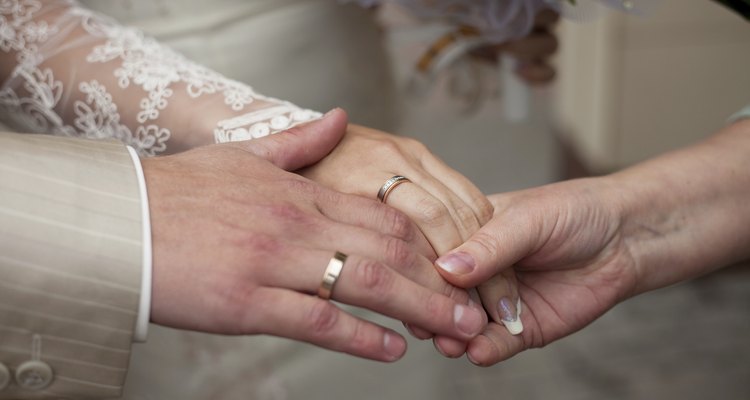
Olga Milkina/iStock/Getty Images
Merriam-Webster defines benediction as a blessing, such as that at the end of worship. In a wedding ceremony, the benediction is a final blessing on the newly married couple by the officiant before the recessional. Although most frequently associated with religious weddings, secular ceremonies can also include a similar type of blessing.
Benediction Placement
Because the benediction occurs at the end of a religious service, this blessing usually occurs after the exchange of vows and rings. According to Dr. Judith Johnson, author of The Wedding Ceremony Planner and the officiant of hundreds of weddings, benedictions work best when they occur before the newlyweds kiss. Because guests expect the wedding party to begin the recessional immediately following the kiss, they may be confused if the benediction is done afterward.
Purpose of the Benediction
Benedictions provide a final opportunity to bless the couple or to send them best wishes for a happy future during the ceremony. In a religious ceremony, the minister uses the benediction to ask God to watch over and protect the couple. In secular ceremonies, the benediction involves hopes for a good life together and a successful marriage.
Religious Benediction Examples
In nonsecular ceremonies, the benediction often comes in the form of prayer or verse from a religious text. For example, some couples choose The Lord’s Prayer as a benediction. For Christian weddings, a number of biblical verses may be appropriate for the benediction, including 1 Corinthians: 13, Ecclesiastes: 4:9-12 and 1 John 4:10. Wedding officiants may also have their own blessings prepared and may allow couples to choose one, or they may pick one they feel will be an appropriate blessing for the couple. Some couples may also choose a benediction that reflects their own cultures, such as one of numerous Irish blessings commonly used as benedictions. Other couples may prefer a religious-themed benediction that does not come from a religious text. In this case, the "Wedding Prayer" by Robert Louis Stevenson is a good example
Nonreligious Benediction Examples
In secular weddings, benedictions come from many sources. Couples who want to incorporate spirituality into their ceremony without referring to a specific God might choose "A Cherokee Prayer" or the "Apache Wedding Blessing." Other couples may choose a poem or other literary work, such as a summary of Plato's Symposium. These benedictions may also come from popular culture, such as song lyrics or movie quotes, or may reference past statements or events that are meaningful to the couple. When choosing a nonsecular benediction, the bride and groom should select something that maintains the purpose of the final blessing even if it leaves out the religious references.
Related Articles
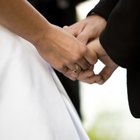
Mandatory Legal Phrases for Wedding Vows

Christian Wedding Prayers and Blessings

Traditional Wedding Prayers and ...

Wedding Blessing Etiquette

Methodist Wedding Ceremony Program

Can a Notary Republic Marry People?

How to Write a Commitment Ceremony

Minister Checklist For a Wedding

What is Said During a Justice of the ...

What Is the Difference Between a ...
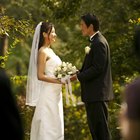
Order of Events for a Non-Religious ...

How to Get Married in the Episcopal ...

How to Officiate a Wedding Renewal

How to Address an Invitation to a Pastor
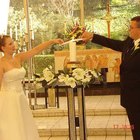
When Do You Light the Unity Candle?

How to Write a Sympathy Thank You to ...

How Do You Address Wedding Invitations ...
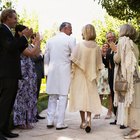
Wedding Ceremony Sequence of Events

Muslim Wedding Etiquette

Wedding Prayers of the Faithful
References
- Merriam-Webster: Benediction
- The Wedding Ceremony Planner: Reverend Judith Johnson, Ph.D
- I Do OBX Weddings: Traditional Ceremony Elements and Their Purposes
- Wedceremony.net: Benedictions and Prayers
- Ceremony Officiants: Wedding Ceremony Readings
Writer Bio
Amy Jorgensen has ghostwritten more than 100 articles and books on raising and training animals. She is also an amateur dog trainer. She has also written more than 200 blog posts, articles, and ebooks on wedding and party planning on behalf of professionals in the field.
Photo Credits
Olga Milkina/iStock/Getty Images